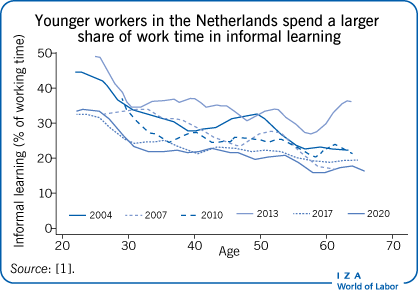Discurso de ascensor
Although early human capital theory recognized the relevance of workers’ experience, its focus was on education and formal training. More recent studies show that much of the performance of newly hired workers is driven by learning by doing or learning from peers or supervisors in the workplace. Descriptive data show that workers learn a lot from the various tasks they perform on the job. Informal learning at work seems to be relevant for all age groups, although it is more meaningful for younger workers’ performance. Informal learning is far more important for workers’ human capital development than formal training courses.
Hallazgos clave
Pros
Informal learning is more important to workers’ performance than formal training.
Learning by doing is often an automatic byproduct of productive work.
Informal learning is highly important for workers with temporary contracts.
New hires have a steep performance increase in their first year of employment.
Knowledge spillovers between peers in the workplace contribute to firm productivity.
Contras
Skills acquired through informal learning are less observable by other employers when compared to skills acquired through formal training.
Informal learning involves costs when less proficient workers are less productive in their jobs.
Most firms do not have adequate human resource management strategies to optimize informal learning in the workplace.
The causal effects of informal learning on worker performance are still unclear.
The economic literature on informal learning is underdeveloped.
